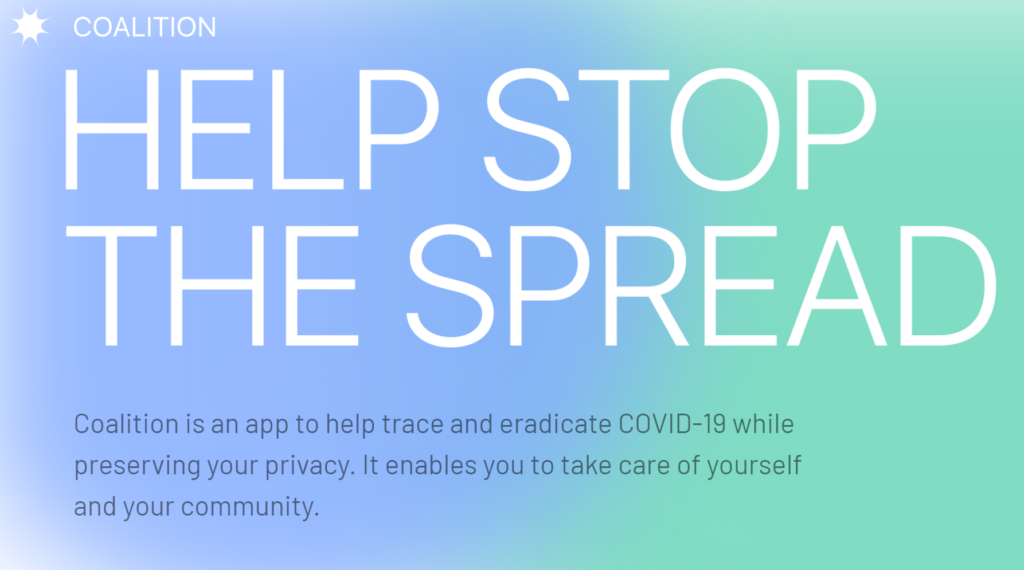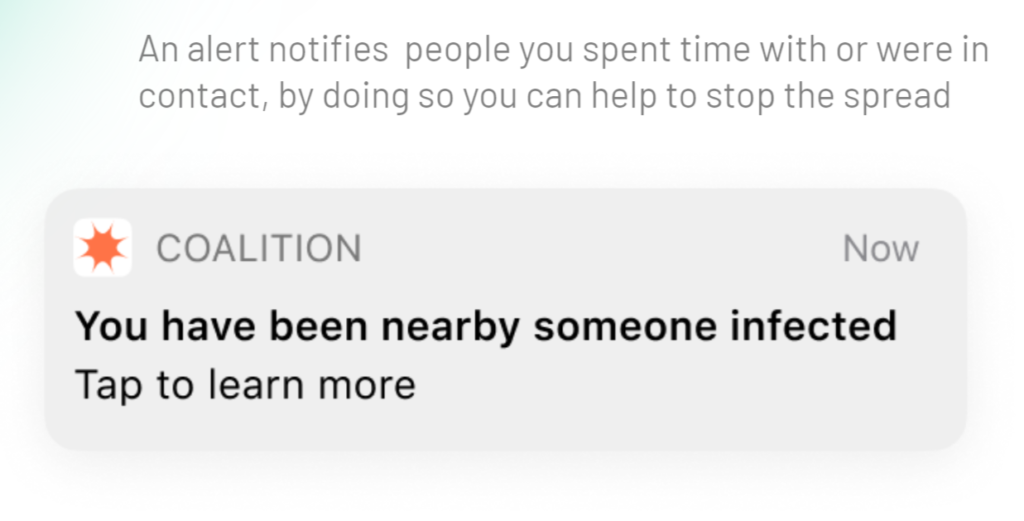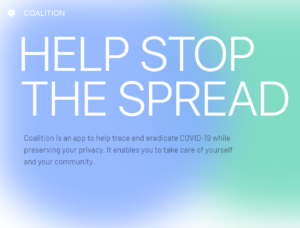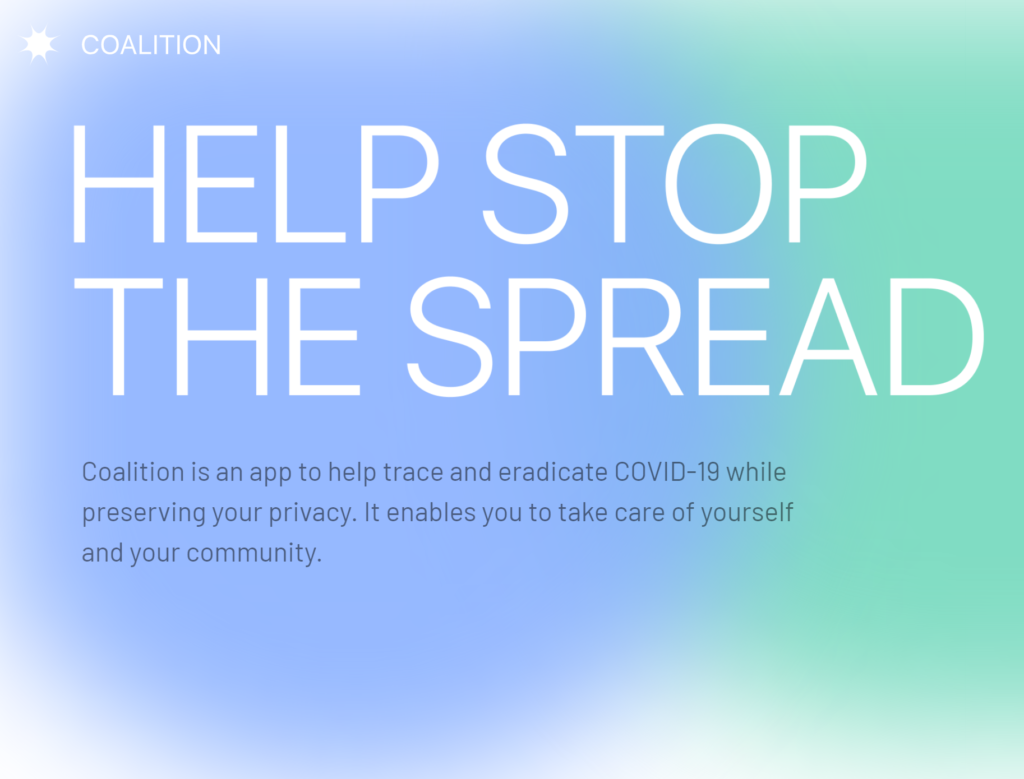Pressure on the private sector is increasing day by day as the demand for technology-based solutions to reduce the spread of the virus rises. A multitude of challenges remain for society in regards to testing and tracking the disease as well as getting people back to work. Time is of the essence.
Fortunately, a variety of teams determined to counteract the spread of COVID-19 have been working tirelessly on solving innovative technological problems associated with the pandemic.
Here are three teams produced by Berkeley’s Blockchain Xcelerator that show immense promise in building the tools and technologies required to tackle the virus:
(1) Nodle.io | Coalition App

Nodle is a global wireless IoT network that securely connects and locates connected devices worldwide using Bluetooth-enabled smartphones.
Uniquely equipped to handle large-scale decentralized network communications and the privacy challenges posed by contact tracing, the Nodle team saw value in applying their existing technology to help stop the spread of the Coronavirus.
“We felt morally compelled to repurpose our technology to launch a separate, tangible app to track, prevent and eradicate the spread of COVID-19.”
Garrett Kinsman, CTO & Cofounder, Nodle + Coalition App
Current statistics point to contact-tracing as a critical technology to curb the exponential spread of the Coronavirus. Thus their app, called Coalition, aims to trace, identify, and notify potential carriers of COVID-19, all while preserving the privacy of its users.

Here’s a video of how it works. Coalition uses a privacy-first contact tracing system that leverages secure Bluetooth and cryptography to protect a user’s identity by making them anonymous.
If a Coalition app user declares that they are sick or have tested positive for COVID-19, their phone can then anonymously inform all other phones that have recently been in proximity. Particular focus will be on those devices which have been near the COVID-19 carrier for an extended period of time during the prior 2 weeks.
Coalition app will be interoperable with other contact tracing solutions including Singapore’s TraceTogether, Google and Apple’s forthcoming framework, and the code will open-sourced for developers looking to make improvements and use the technology for the future.
Coalition is kicking off its launch this week with local leaders from the City of Berkeley through a series of virtual town halls with Mayor Jesse Arreguin and City Councilmember Ben Bartlett. “You have my full support and commitment to help bring this life-saving application to affected communities everywhere,” Bartlett said in his letter of endorsement.
The app is available for free download onApp StoreGoogle Play and pending release on the App Store.
(2) Anchain.AI
It is an unfortunate truth that people with malintent often take advantage of global emergencies such as political revolutions or global pandemics as an opportunity to spread computer viruses and earn money through scamming.
Enter AI-powered security hero Anchain. According to mercurynews, Anchain recently helped international law enforcement agencies to track down fraudsters who took advantage of the fear surrounding COVID-19 by scamming buyers out of more than $2 million worth of non-existent ‘coronavirus-protection items.’ The scammers lured hopeful buyers to platforms such as Whatsapp and WeChat, claiming to sell face masks, medication, and hand sanitizer through these apps. Taking payments through cryptocurrency, the scammers then ghosted their buyers upon receiving payment. Anchain collaborated with law enforcement to identify and disrupt these malicious sellers.
The Anchain platform works by monitoring specific blockchains around the clock, allowing them to minimize detection and response times, create customer behavior alerts, leverage live transaction metrics, and track ecosystem activity within and around communities.
With all of their expertise in the inner workings of blockchain, Anchain.AI may be uniquely poised to prevent bad actors from using cryptocurrency to take advantage of desperate users online. In the era of COVID-19, this is a much-needed service.
(3) Snark Health
Snark Health is a platform that connects patients, doctors, insurers, donors, and health care services to allow for private data sharing and payments via blockchain technology.
During the uncertain times in which we find ourselves, Snark hopes to partner and collaborate with others in the healthcare sector by using their technology to improve patient outcomes:
The global response to the COVID-19 pandemic is at a critical point and requires unprecedented coordination. We are building a framework for data-driven discussions and shared learnings to help people have a greater impact at their respective local, state, national level in collaboration with their organizations and governmental agencies. Our efforts are aimed at enabling more rapid dissemination of information to improve patient outcomes. Our goal is to facilitate the exchange of knowledge, best practices, and lessons learned to support the people and organizations that are tasked with problem-solving at the local level across the globe.
As part of these efforts, Snark will be rolling out a USSD service that provides an additional means of disseminating information to those who do not currently have a smartphone or internet access. In addition, they are in the process of forming a virtual health community.
Snark will be using Slack to facilitate discussions around data, processes, and lessons learned from nurses, doctors, and health-professionals during this virus. To join Snark Health Slack Channel, click here.
To learn more about how Snark Health is using smart-contracts and cryptocurrency empower patients and redistribute wasted resources, read up at their website.
Pressure on the private sector is increasing day by day as the demand for technology-based solutions to reduce the spread of the virus rises. A multitude of challenges remain for society in regards to testing and tracking the disease as well as getting people back to work. Time is of the essence.
Fortunately, a variety of teams determined to counteract the spread of COVID-19 have been working tirelessly on solving innovative technological problems associated with the pandemic.
Here are three teams produced by Berkeley’s Blockchain Xcelerator that show immense promise in building the tools and technologies required to tackle the virus:
(1) Nodle.io | Coalition App

Nodle is a global wireless IoT network that securely connects and locates connected devices worldwide using Bluetooth-enabled smartphones.
Uniquely equipped to handle large-scale decentralized network communications and the privacy challenges posed by contact tracing, the Nodle team saw value in applying their existing technology to help stop the spread of the Coronavirus.
“We felt morally compelled to repurpose our technology to launch a separate, tangible app to track, prevent and eradicate the spread of COVID-19.”
Garrett Kinsman, CTO & Cofounder, Nodle + Coalition App
Current statistics point to contact-tracing as a critical technology to curb the exponential spread of the Coronavirus. Thus their app, called Coalition, aims to trace, identify, and notify potential carriers of COVID-19, all while preserving the privacy of its users.

Here’s a video of how it works. Coalition uses a privacy-first contact tracing system that leverages secure Bluetooth and cryptography to protect a user’s identity by making them anonymous.
If a Coalition app user declares that they are sick or have tested positive for COVID-19, their phone can then anonymously inform all other phones that have recently been in proximity. Particular focus will be on those devices which have been near the COVID-19 carrier for an extended period of time during the prior 2 weeks.
Coalition app will be interoperable with other contact tracing solutions including Singapore’s TraceTogether, Google and Apple’s forthcoming framework, and the code will open-sourced for developers looking to make improvements and use the technology for the future.
Coalition is kicking off its launch this week with local leaders from the City of Berkeley through a series of virtual town halls with Mayor Jesse Arreguin and City Councilmember Ben Bartlett. “You have my full support and commitment to help bring this life-saving application to affected communities everywhere,” Bartlett said in his letter of endorsement.
The app is available for free download onApp StoreGoogle Play and pending release on the App Store.
(2) Anchain.AI
It is an unfortunate truth that people with malintent often take advantage of global emergencies such as political revolutions or global pandemics as an opportunity to spread computer viruses and earn money through scamming.
Enter AI-powered security hero Anchain. According to mercurynews, Anchain recently helped international law enforcement agencies to track down fraudsters who took advantage of the fear surrounding COVID-19 by scamming buyers out of more than $2 million worth of non-existent ‘coronavirus-protection items.’ The scammers lured hopeful buyers to platforms such as Whatsapp and WeChat, claiming to sell face masks, medication, and hand sanitizer through these apps. Taking payments through cryptocurrency, the scammers then ghosted their buyers upon receiving payment. Anchain collaborated with law enforcement to identify and disrupt these malicious sellers.
The Anchain platform works by monitoring specific blockchains around the clock, allowing them to minimize detection and response times, create customer behavior alerts, leverage live transaction metrics, and track ecosystem activity within and around communities.
With all of their expertise in the inner workings of blockchain, Anchain.AI may be uniquely poised to prevent bad actors from using cryptocurrency to take advantage of desperate users online. In the era of COVID-19, this is a much-needed service.
(3) Snark Health
Snark Health is a platform that connects patients, doctors, insurers, donors, and health care services to allow for private data sharing and payments via blockchain technology.
During the uncertain times in which we find ourselves, Snark hopes to partner and collaborate with others in the healthcare sector by using their technology to improve patient outcomes:
The global response to the COVID-19 pandemic is at a critical point and requires unprecedented coordination. We are building a framework for data-driven discussions and shared learnings to help people have a greater impact at their respective local, state, national level in collaboration with their organizations and governmental agencies. Our efforts are aimed at enabling more rapid dissemination of information to improve patient outcomes. Our goal is to facilitate the exchange of knowledge, best practices, and lessons learned to support the people and organizations that are tasked with problem-solving at the local level across the globe.
As part of these efforts, Snark will be rolling out a USSD service that provides an additional means of disseminating information to those who do not currently have a smartphone or internet access. In addition, they are in the process of forming a virtual health community.
Snark will be using Slack to facilitate discussions around data, processes, and lessons learned from nurses, doctors, and health-professionals during this virus. To join Snark Health Slack Channel, click here.
To learn more about how Snark Health is using smart-contracts and cryptocurrency empower patients and redistribute wasted resources, read up at their website.


